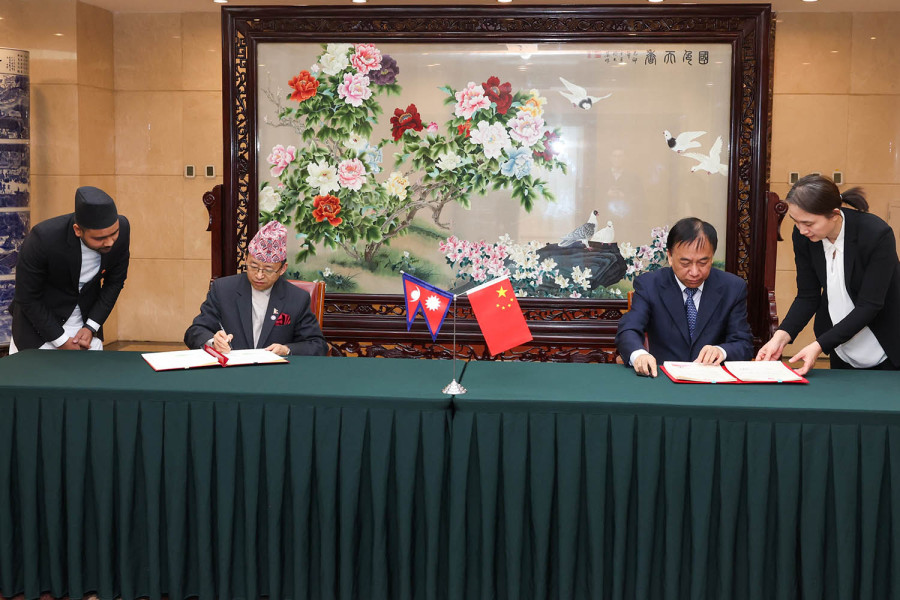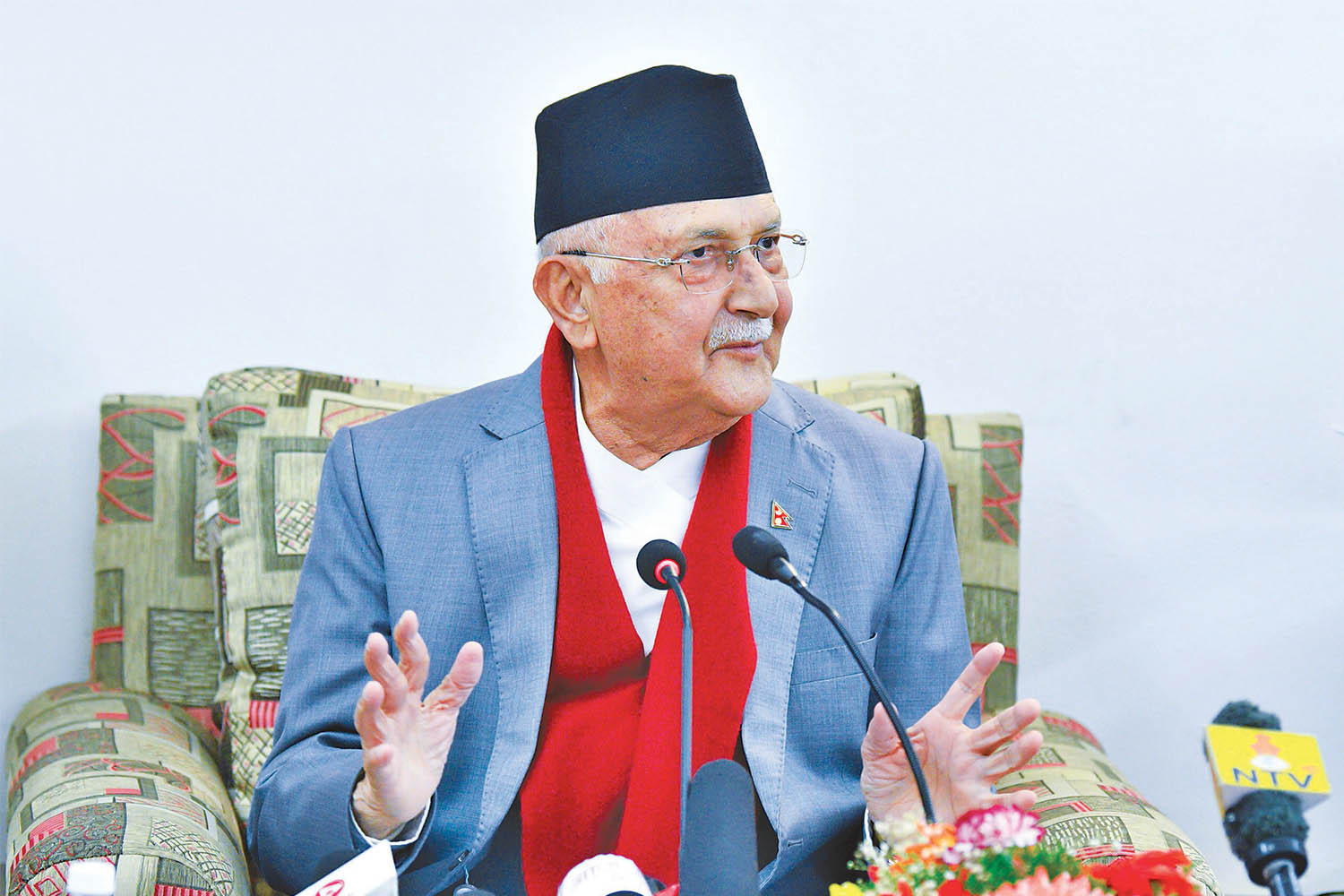National
Differences in ruling Congress over new BRI framework deal
Some in the ruling party criticise the agreement as departure from party stance while others defend it.
Purushottam Poudel
Some leaders of the ruling Nepali Congress have criticised the signing of the framework for the Belt and Road Initiative (BRI) cooperation between Nepal and China, which would allow Nepali projects under the Chinese initiative to be implemented under ‘aid assistance financing’.
The Congress, the largest party in the ruling coalition, was firm on its stance that Nepal should not accept any loan to execute BRI projects.
On Wednesday, the third day of Prime Minister KP Sharma Oli’s China visit, Nepal and China agreed to take the BRI cooperation framework forward under aid assistance. A Congress leader said it would have been appropriate to define ‘aid assistance financing’.
“People have interpreted the term as a combination of grants and loans,” NP Saud, a Congress leader and former foreign minister, told the Post. “Though the official document of the agreement is yet to be disclosed, if the agreement was based on the ‘technical support and aid financing modality,’ it would be against the stance the party took on the implementation of BRI projects.”
Congress leaders say if the agreement with China was reached as reported in the media, it signals a departure from the party’s foreign policy and aligns the Congress with the CPN-UML, another ruling party.
Arjun Narashinga KC, a senior Congress leader who was a member of the prime ministerial delegation to China, said they were not aware of the exact financial modality for BRI cooperation that was agreed to.
“We were briefed that various financial modalities were up for discussion, but we were not informed about the specifics of the signed modality,” KC told the Post.
When the Post asked him what would have been his reaction had he known they had agreed on aid assistance to fund BRI projects, he replied, “Aid assistance does not necessarily imply that Nepal will accept loans.”
Another Congress leader criticised the party leadership’s decision-making style as ad-hoc and immature. The Congress had already decided against accepting loans under the BRI, and the two-party [Congress-UML] task force had also endorsed this stance ahead of the prime minister's China visit, the leader said.
The task force, which had Gagan Thapa and Semanta Dahal from the Congress and Bishnu Rimal and Yuba Raj Khatiwada from the UML, had agreed to press ahead with the BRI projects only under grant assistance. But the two countries eventually settled for ‘aid assistance’.
“If we were going to accept ‘aid assistance’, why did the party oppose loans for developing BRI projects in the first place?” said Govinda Raj Pokharel, a former chairperson of the National Planning Commission and Congress leader, questioning the party leadership.
Rameshore Khanal, chair of the Oli government’s high-level economic reform recommendation commission, explained that aid financing generally includes both grants and loans.
“However, in aid assistance, loans will be concessional as per international practice, which means Nepal may not have to repay the full capital,” Khanal told the Post.
“However, if we invest such loans in politically-motivated projects that seldom give good returns, then it could spell a disaster,” Khanal added.
Addressing a press conference upon his return to Kathmandu on Thursday, Prime Minister Oli claimed that they didn’t even discuss loans during his entire stay in China.
“This time, we talked about various projects under the BRI. We will have discussions and agreements on how to implement those projects later,” Oli added. “The assistance we received from China is not a loan, I request you not to repeatedly call it a loan.”

But not all Congress leaders oppose the agreement.
In diplomacy, words must be used carefully, says Min Bahadur Bishwakarma, the head of the Congress’ publicity department.
“At that stage of negotiation, there was no better term than ‘aid assistance’, especially if we translate that term into Nepali,” Bishwakarma, who is close to Congress President Sher Bahadur Deuba, told the Post. “The ‘aid assistance’ under which Nepal has agreed to sign the framework for BRI cooperation is unrelated to our official line of our party.”
Earlier, on July 1, the Congress at a meeting of the party's office bearers and former office bearers had decided that Nepal should only accept grants, not loans, for implementing BRI projects. The meeting was held the same day the Congress and UML officially reached a midnight deal to form a coalition government under Oli's leadership.
“The Congress was never in a position to refuse assistance from China, including for BRI projects. Our party just said that Nepal cannot afford any loan to implement such projects,” Bishwakarma told the Post. “Agreeing on aid assistance does not mean Nepal will accept Chinese loans.”
Meanwhile, the main opposition Maoist Centre has decided to come up with the party’s official view only after studying the agreement in detail.
At a meeting of the party office bearers held at party chief Pushpa Kamal Dahal’s residence on Thursday, the Maoist Centre decided not to hastily form an opinion on the agreement.
However, the secretary of the Maoist Centre, Ganesh Shah, said that he personally views the agreement in a positive light.
“Every country wants to increase its influence in Nepal. With the signing of the BRI deal, other countries, including neighbours, also might think of investing in Nepal,” Shah said. “If we carefully manage these investments, they will benefit Nepal.”
Shah also said that the BRI agreement between the two countries is no different to the agreement the Dahal government earlier tried to sign with China during his tenure that ended in July.
When the Maoist Centre chief Dahal led the coalition government with the UML, Nepal and China tried to finalise the BRI implementation plan during the 16th round of the Nepal-China diplomatic consultation mechanism meeting, held on June 25 in Kathmandu. But they could not agree on the modality to finance the projects.
Back then, the Ministry of Foreign Affairs of Nepal had corresponded with the Prime Minister’s Office to seek approval to sign the implementation plan during the diplomatic consultation mechanism meeting attended by Chinese Vice Foreign Minister Sun Weidong, but it failed.
During Prime Minister Oli’s latest China visit, the two sides agreed to proceed with ten projects under the BRI cooperation framework.
After seven years and seven months of signing the memorandum of understanding on the BRI, Nepal and China signed a framework for BRI cooperation on Wednesday.
Acting Foreign Secretary Amrit Bahadur Rai and deputy head of China’s National Development and Reform Commission Liu Sushe signed the framework cooperation on behalf of the respective countries. The commission is the focal agency in China tasked with developing BRI projects.
The new BRI agreement will be valid for three years, and there will be another three-year extension unless the agreement is terminated by either side.
Just before the prime minister left for Beijing on December 2, the Nepali side had sent a revised version of the framework for BRI cooperation that insisted on ‘grants’ as the project financing model. But the Chinese side objected and replaced the term with ‘assistance financing’, and returned the document to the Nepali side for consideration.
After several rounds of discussion between the two countries, an agreement was reached to expedite the BRI in Nepal under aid finance modalities.




 10.12°C Kathmandu
10.12°C Kathmandu














